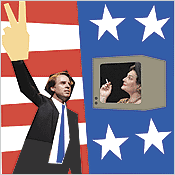
Political theater, all too often, makes for bad politics and worse theater. The one-two punch of Iraq and the ’04 election turned New York into a citywide expo of unbearable agitprop: clichéd characters, overripe metaphors, a grasp of politics so adolescent it made the talking heads sound subtle. Even Sam Shepard took the bait. A delightful surprise, then, to find that two new plays have given New York its best week of political theater in years. Though they are hobbled by flaws in writing and staging, both treat political idealism with such skill they leave you inspired all the same.
Rinne Groff’s The Ruby Sunrise may not strike you as a political play at all, if your idea of political drama involves red-faced senators barking at one another across the aisle. In an Indiana barn, in the twenties, precocious Ruby (Marin Ireland) invents television. Family pressures and an uncomprehending world frustrate her work, and someone else (Philo T. Farnsworth, on whose story the play seems to be based) beats her to glory. A quarter-century later, Ruby’s daughter Lulu (Maggie Siff) tries to win a hearing for her mother’s story at the TV studio where she works as a script girl.
Groff assembles the story with a nod to Tom Stoppard, past and present ricocheting off one another in illuminating ways. The chief attraction is discovering the idealism that mother and daughter share. Ruby is “a crafty dreamer” who develops television because she thinks it will bring about universal harmony. “Who could bear to see war right in your own living room?” she asks. Lulu dares her communist-fearing employers to fire her by singing the praises of the little guy and extolling television’s ability to help him.
Those grand predictions strike us as laughably naïve, of course. Yet somehow Groff makes the dramatic irony seem not diminishing but ennobling. Even as her play shows the folly of Ruby’s and Lulu’s dreams, it celebrates them for persisting in those dreams; she exposes the limits of idealism while inspiring us to embrace idealism anew. It is a mature work from a young playwright.
Groff’s wisdom isn’t always borne out by her script or Oskar Eustis’s production. Thanks to wobbly casting and sluggish pacing, Ruby’s early scenes miscarry badly. Later, the play doesn’t entirely resolve its Stoppard streak with its Odets ideals. Of course, there are many faults graver than a play’s having too much on its mind.
At the Culture Project, Jack Holmes’s solo play RFK performs a similar trick, extracting gold from someplace dark and dusty. From its crushingly banal opening lines (“Life has a way of forcing changes on us”) to its shoehorned finale, the play had me stifling winces, groans, yawns. Yet there I was at the end, stumbling out of the theater, inspired and deeply moved.
A shelf of biographies demonstrates how compelling Bobby Kennedy’s short, contradictory life was: Holmes shows how powerfully it suits the stage. Here is a man who cited Shaw and Shakespeare in major public addresses, who called Aeschylus his favorite poet. On the night of Martin Luther King Jr.’s death, Kennedy gave a famously extemporized speech from the back of a flatbed truck, quoting the great Greek tragedian from memory.
That speech is one of the highlights of Holmes’s captivating show. Despite all the clunky writing, he adroitly organizes RFK’s story, zigzagging from 1964 to his childhood to his assassination in 1968. As an actor, Holmes hits a wrong note now and then too, but conveys a sweet gawkiness that suits Jack’s kid brother. Holmes is sympathetic, but he doesn’t shy from his subject’s vindictive misdeeds, as when RFK tapped King’s phone.
Holmes and director Larry Moss surpass simple biography—they realize the full tragic dimension of the man. It is excruciating to watch Bobby agonize over his decision to run for president in 1968, all but howling, “Why does it have to be me?” We feel the loss of the tormented private Bobby, and of RFK the charismatic leader and visionary, the one who declared, “Nineteen sixty-eight will go down in history as the year the new politics began.”
It didn’t. Holmes, like Groff, shows the enormous obstacles that lie in the idealist’s way, even as it makes you crave such a figure. To say that Bobby Kennedy possessed more bravery, eloquence, and moral passion than any leader since his death may be a cliché; RFK reminds us how it came to be one. Like The Ruby Sunrise, the play is measured and intelligent, optimistic yet clear-eyed—in other words, just right for our hysterical moment. It is precisely when the country is losing its mind that playwrights shouldn’t lose their heads.
The Ruby Sunrise
By Rinne Groff.
The Public Theater.
Through December 4.
RFK
By Jack Holmes.
The Culture Project.
Through February 5.